HND Unit 18: Action Research Proposal on Abuse in Domiciliary Care
VerifiedAdded on 2023/01/11
|11
|1425
|42
Report
AI Summary
This report presents a comprehensive action research proposal focusing on abuse towards service providers within domiciliary care settings in Waltham Forest. The proposal outlines the aims and objectives of the research, which include analyzing the impact of abuse on service providers' ability to deliver care and identifying ways to address the issue. The research incorporates a literature review, exploring the concept of domiciliary care, the different forms of abuse, and the methods used by service providers to manage abusive situations. The proposal details the research methodology, including data collection methods and ethical considerations, such as informed consent and data security. It also specifies the activities, timescales, and milestones for the research project, ensuring a structured approach to the investigation. The report concludes with a discussion of ethical issues and a declaration of adherence to research ethics policies.

Innovation and Improvement
through Action Research
through Action Research
Paraphrase This Document
Need a fresh take? Get an instant paraphrase of this document with our AI Paraphraser
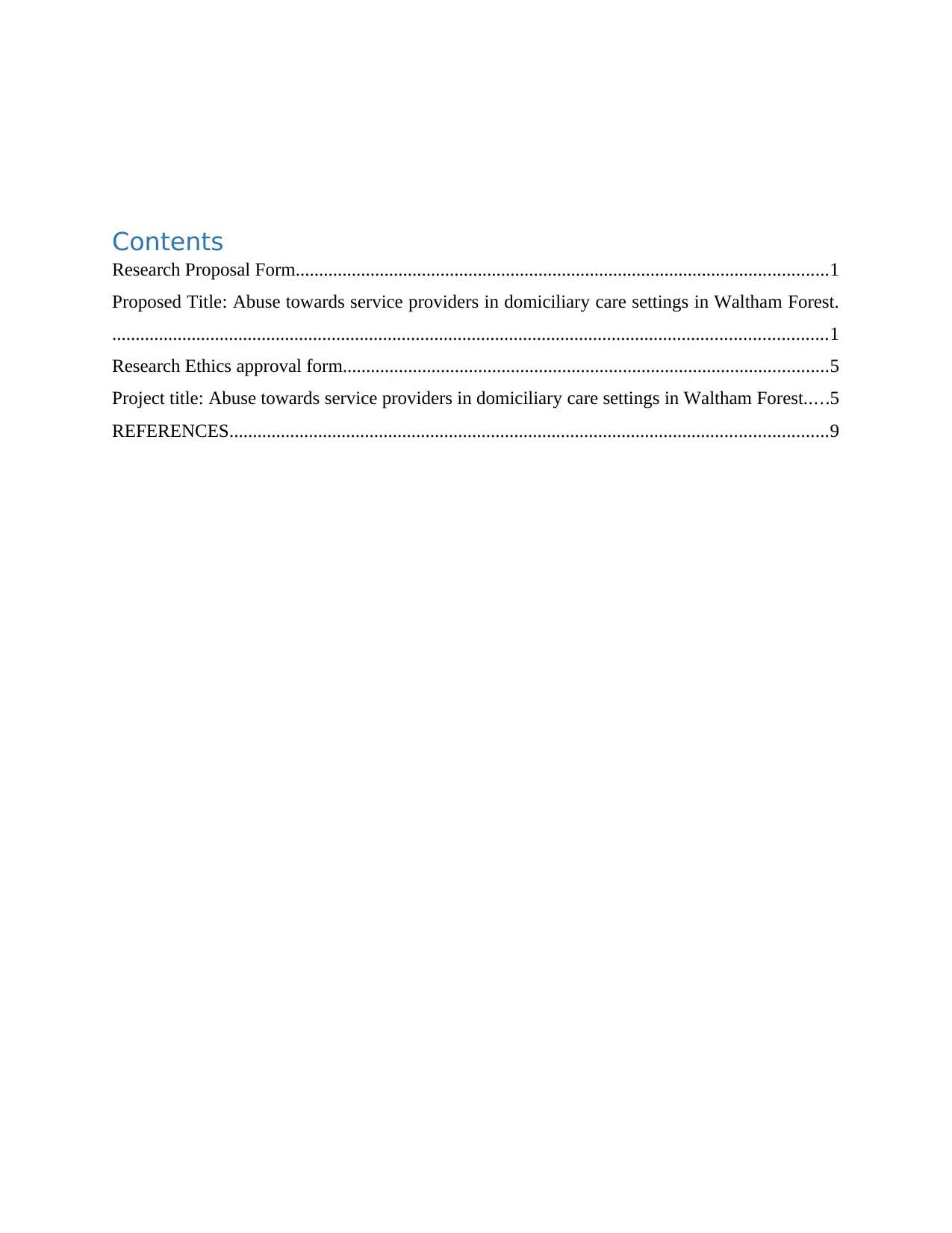
Contents
Research Proposal Form..................................................................................................................1
Proposed Title: Abuse towards service providers in domiciliary care settings in Waltham Forest.
.........................................................................................................................................................1
Research Ethics approval form........................................................................................................5
Project title: Abuse towards service providers in domiciliary care settings in Waltham Forest.....5
REFERENCES................................................................................................................................9
Research Proposal Form..................................................................................................................1
Proposed Title: Abuse towards service providers in domiciliary care settings in Waltham Forest.
.........................................................................................................................................................1
Research Ethics approval form........................................................................................................5
Project title: Abuse towards service providers in domiciliary care settings in Waltham Forest.....5
REFERENCES................................................................................................................................9

Research Proposal Form
Student Name: ______________________ Student ID: ____________
Centre Name: _____________________
Tutor: ________________ Date: ___________________
Unit: ____________________
Proposed Title: Abuse towards service providers in domiciliary care settings
in Waltham Forest.
Section One: Title, aims, objectives
Aim: To analyse the impact of abuse upon service ability of providers within domiciliary care
settings. A case study on Waltham Forest Council.
Research Objectives
To understand about the concept of domiciliary care settings.
To analyse the ways of Abuse using against service providers of domiciliary care
settings and its impact upon their service ability.
To analyse the ways using by service providers to deal with situation of abuse within
domiciliary care settings.
Research questions
What do you mean by the concept of domiciliary care settings?
What are the different ways uses to abuse service providers of domiciliary care settings
and its impact upon their service ability?
What are the ways uses by service provider to deal with situation of abuse within
domiciliary care settings?
Section Two: Reasons for choosing this research project
The two reasons for selecting this project include personal interest in topic and to improve
current level of conditions within domiciliary care settings so service providers able to deliver
better service.
Section Three: Literature sources searched
Understanding about the concept of domiciliary care settings
Domiciliary care is provided to those people who live in their houses but requires the
additional level of care with carrying of various activities such as performing household tasks,
1
Student Name: ______________________ Student ID: ____________
Centre Name: _____________________
Tutor: ________________ Date: ___________________
Unit: ____________________
Proposed Title: Abuse towards service providers in domiciliary care settings
in Waltham Forest.
Section One: Title, aims, objectives
Aim: To analyse the impact of abuse upon service ability of providers within domiciliary care
settings. A case study on Waltham Forest Council.
Research Objectives
To understand about the concept of domiciliary care settings.
To analyse the ways of Abuse using against service providers of domiciliary care
settings and its impact upon their service ability.
To analyse the ways using by service providers to deal with situation of abuse within
domiciliary care settings.
Research questions
What do you mean by the concept of domiciliary care settings?
What are the different ways uses to abuse service providers of domiciliary care settings
and its impact upon their service ability?
What are the ways uses by service provider to deal with situation of abuse within
domiciliary care settings?
Section Two: Reasons for choosing this research project
The two reasons for selecting this project include personal interest in topic and to improve
current level of conditions within domiciliary care settings so service providers able to deliver
better service.
Section Three: Literature sources searched
Understanding about the concept of domiciliary care settings
Domiciliary care is provided to those people who live in their houses but requires the
additional level of care with carrying of various activities such as performing household tasks,
1
⊘ This is a preview!⊘
Do you want full access?
Subscribe today to unlock all pages.

Trusted by 1+ million students worldwide
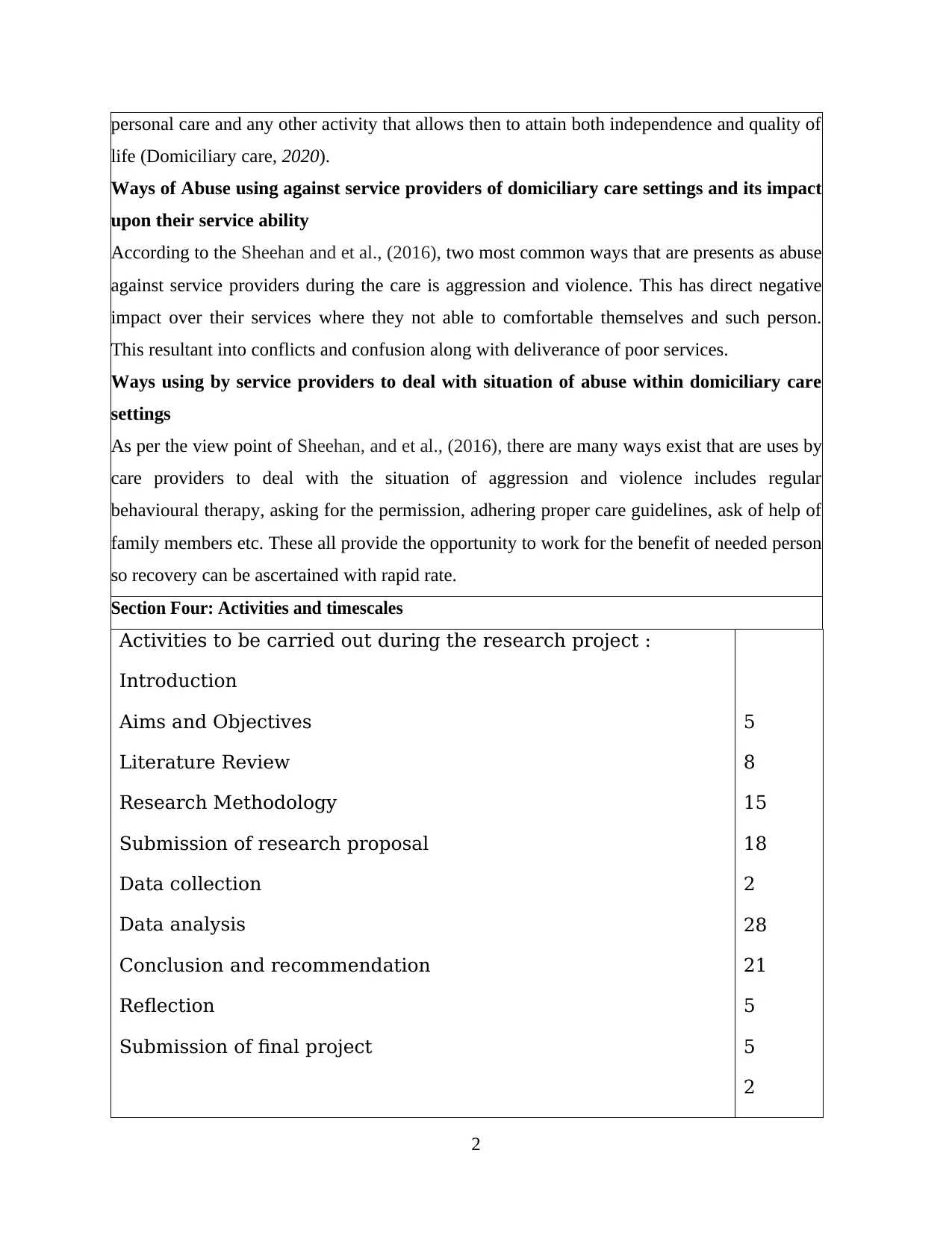
personal care and any other activity that allows then to attain both independence and quality of
life (Domiciliary care, 2020).
Ways of Abuse using against service providers of domiciliary care settings and its impact
upon their service ability
According to the Sheehan and et al., (2016), two most common ways that are presents as abuse
against service providers during the care is aggression and violence. This has direct negative
impact over their services where they not able to comfortable themselves and such person.
This resultant into conflicts and confusion along with deliverance of poor services.
Ways using by service providers to deal with situation of abuse within domiciliary care
settings
As per the view point of Sheehan, and et al., (2016), there are many ways exist that are uses by
care providers to deal with the situation of aggression and violence includes regular
behavioural therapy, asking for the permission, adhering proper care guidelines, ask of help of
family members etc. These all provide the opportunity to work for the benefit of needed person
so recovery can be ascertained with rapid rate.
Section Four: Activities and timescales
Activities to be carried out during the research project :
Introduction
Aims and Objectives
Literature Review
Research Methodology
Submission of research proposal
Data collection
Data analysis
Conclusion and recommendation
Reflection
Submission of final project
5
8
15
18
2
28
21
5
5
2
2
life (Domiciliary care, 2020).
Ways of Abuse using against service providers of domiciliary care settings and its impact
upon their service ability
According to the Sheehan and et al., (2016), two most common ways that are presents as abuse
against service providers during the care is aggression and violence. This has direct negative
impact over their services where they not able to comfortable themselves and such person.
This resultant into conflicts and confusion along with deliverance of poor services.
Ways using by service providers to deal with situation of abuse within domiciliary care
settings
As per the view point of Sheehan, and et al., (2016), there are many ways exist that are uses by
care providers to deal with the situation of aggression and violence includes regular
behavioural therapy, asking for the permission, adhering proper care guidelines, ask of help of
family members etc. These all provide the opportunity to work for the benefit of needed person
so recovery can be ascertained with rapid rate.
Section Four: Activities and timescales
Activities to be carried out during the research project :
Introduction
Aims and Objectives
Literature Review
Research Methodology
Submission of research proposal
Data collection
Data analysis
Conclusion and recommendation
Reflection
Submission of final project
5
8
15
18
2
28
21
5
5
2
2
Paraphrase This Document
Need a fresh take? Get an instant paraphrase of this document with our AI Paraphraser

3
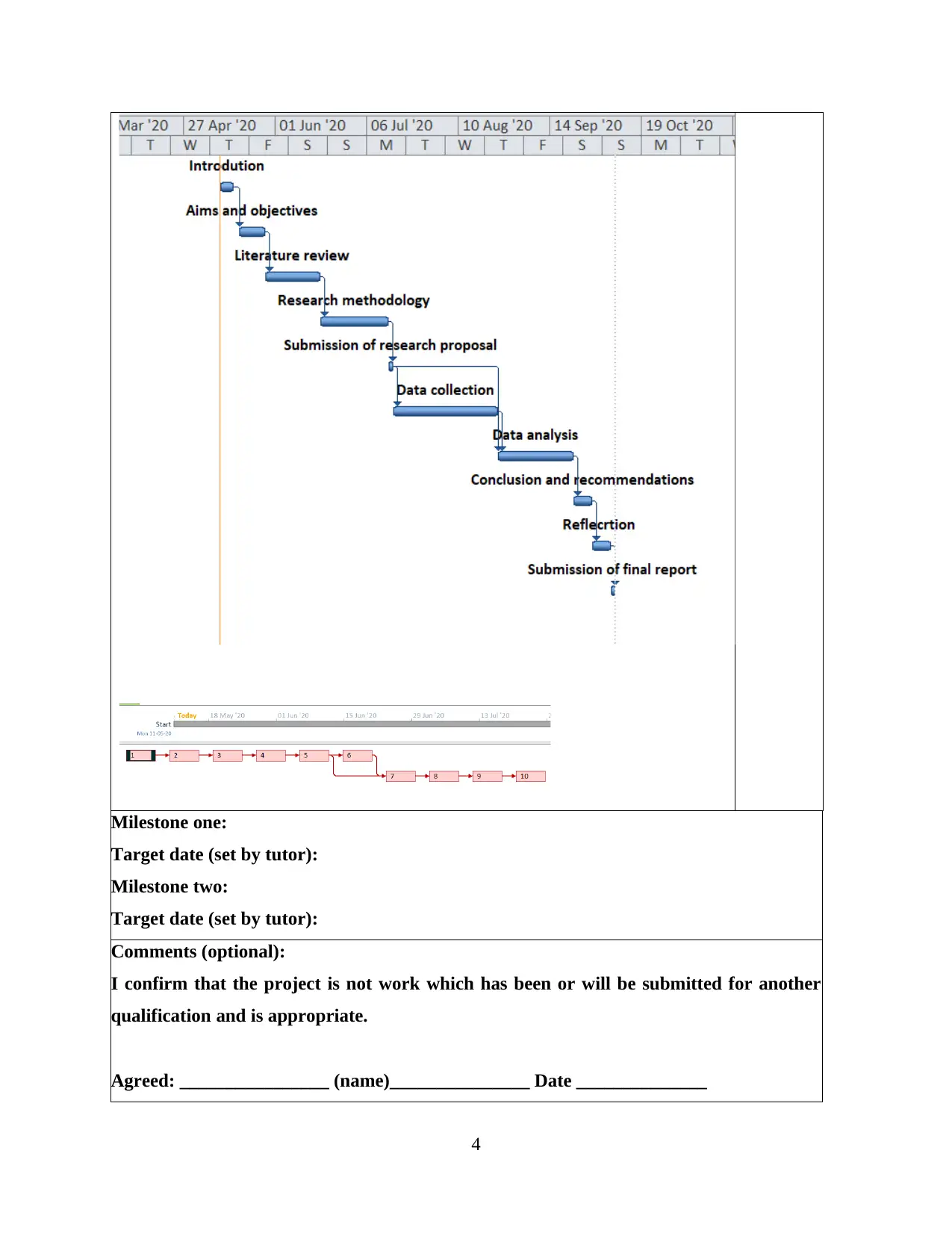
Milestone one:
Target date (set by tutor):
Milestone two:
Target date (set by tutor):
Comments (optional):
I confirm that the project is not work which has been or will be submitted for another
qualification and is appropriate.
Agreed: ________________ (name)_______________ Date ______________
4
Target date (set by tutor):
Milestone two:
Target date (set by tutor):
Comments (optional):
I confirm that the project is not work which has been or will be submitted for another
qualification and is appropriate.
Agreed: ________________ (name)_______________ Date ______________
4
⊘ This is a preview!⊘
Do you want full access?
Subscribe today to unlock all pages.

Trusted by 1+ million students worldwide
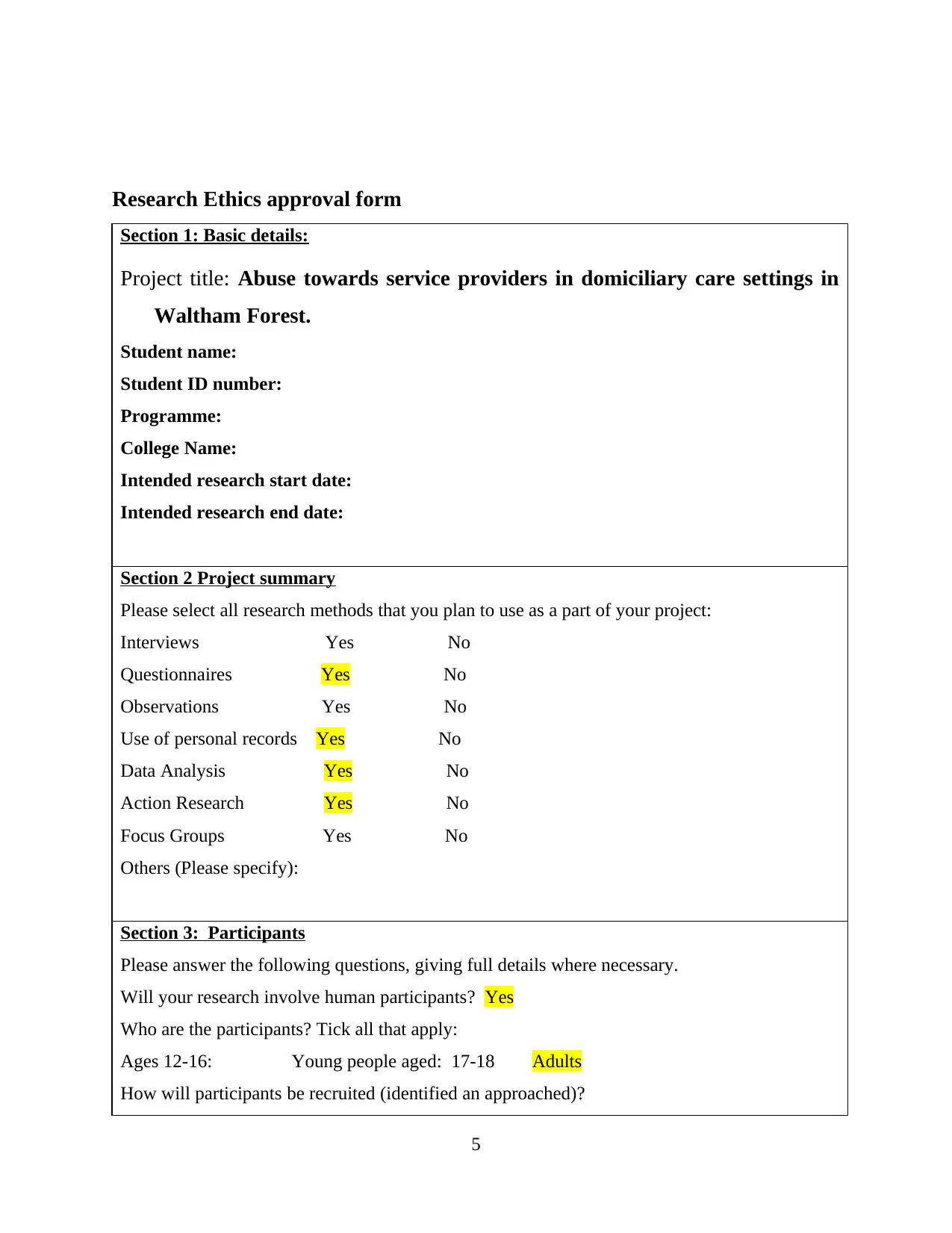
Research Ethics approval form
Section 1: Basic details:
Project title: Abuse towards service providers in domiciliary care settings in
Waltham Forest.
Student name:
Student ID number:
Programme:
College Name:
Intended research start date:
Intended research end date:
Section 2 Project summary
Please select all research methods that you plan to use as a part of your project:
Interviews Yes No
Questionnaires Yes No
Observations Yes No
Use of personal records Yes No
Data Analysis Yes No
Action Research Yes No
Focus Groups Yes No
Others (Please specify):
Section 3: Participants
Please answer the following questions, giving full details where necessary.
Will your research involve human participants? Yes
Who are the participants? Tick all that apply:
Ages 12-16: Young people aged: 17-18 Adults
How will participants be recruited (identified an approached)?
5
Section 1: Basic details:
Project title: Abuse towards service providers in domiciliary care settings in
Waltham Forest.
Student name:
Student ID number:
Programme:
College Name:
Intended research start date:
Intended research end date:
Section 2 Project summary
Please select all research methods that you plan to use as a part of your project:
Interviews Yes No
Questionnaires Yes No
Observations Yes No
Use of personal records Yes No
Data Analysis Yes No
Action Research Yes No
Focus Groups Yes No
Others (Please specify):
Section 3: Participants
Please answer the following questions, giving full details where necessary.
Will your research involve human participants? Yes
Who are the participants? Tick all that apply:
Ages 12-16: Young people aged: 17-18 Adults
How will participants be recruited (identified an approached)?
5
Paraphrase This Document
Need a fresh take? Get an instant paraphrase of this document with our AI Paraphraser

Describe the processes you will use to inform participants about what you are doing:
With the help of e-male, informed consent, research will inform participants about the
research.
How will you obtain consent from participants? Will this be written? How will it be made clear
to participants that they may withdraw consent to participate at any time?
With the help of questionnaire that will be written. By providing each information about
the research aim and objectives to the research, that will be essential for participants to
withdraw consent to participate at any time
Studies involving questionnaires: will participants be given the option of omitting questions that
do not wish to answer?
Yes No
If no, please explain why below and ensure that you cover any ethical issues arising from this
Studies involving observation:
Confirm whether participants will be asked for their informed consent to be observed.
Yes No
Will you debrief participants at the end of their participation (i.e give them a brief explanation
of the study)?
Yes No
Will participants be given information about the findings of your study? (This could be a brief
summary of your findings in general)
Yes No
Section 4: Data Storage and Security
Confirm that all personal data will be stored and processed in compliance with the Data
Protection Act (1998)
Yes, No
6
With the help of e-male, informed consent, research will inform participants about the
research.
How will you obtain consent from participants? Will this be written? How will it be made clear
to participants that they may withdraw consent to participate at any time?
With the help of questionnaire that will be written. By providing each information about
the research aim and objectives to the research, that will be essential for participants to
withdraw consent to participate at any time
Studies involving questionnaires: will participants be given the option of omitting questions that
do not wish to answer?
Yes No
If no, please explain why below and ensure that you cover any ethical issues arising from this
Studies involving observation:
Confirm whether participants will be asked for their informed consent to be observed.
Yes No
Will you debrief participants at the end of their participation (i.e give them a brief explanation
of the study)?
Yes No
Will participants be given information about the findings of your study? (This could be a brief
summary of your findings in general)
Yes No
Section 4: Data Storage and Security
Confirm that all personal data will be stored and processed in compliance with the Data
Protection Act (1998)
Yes, No
6
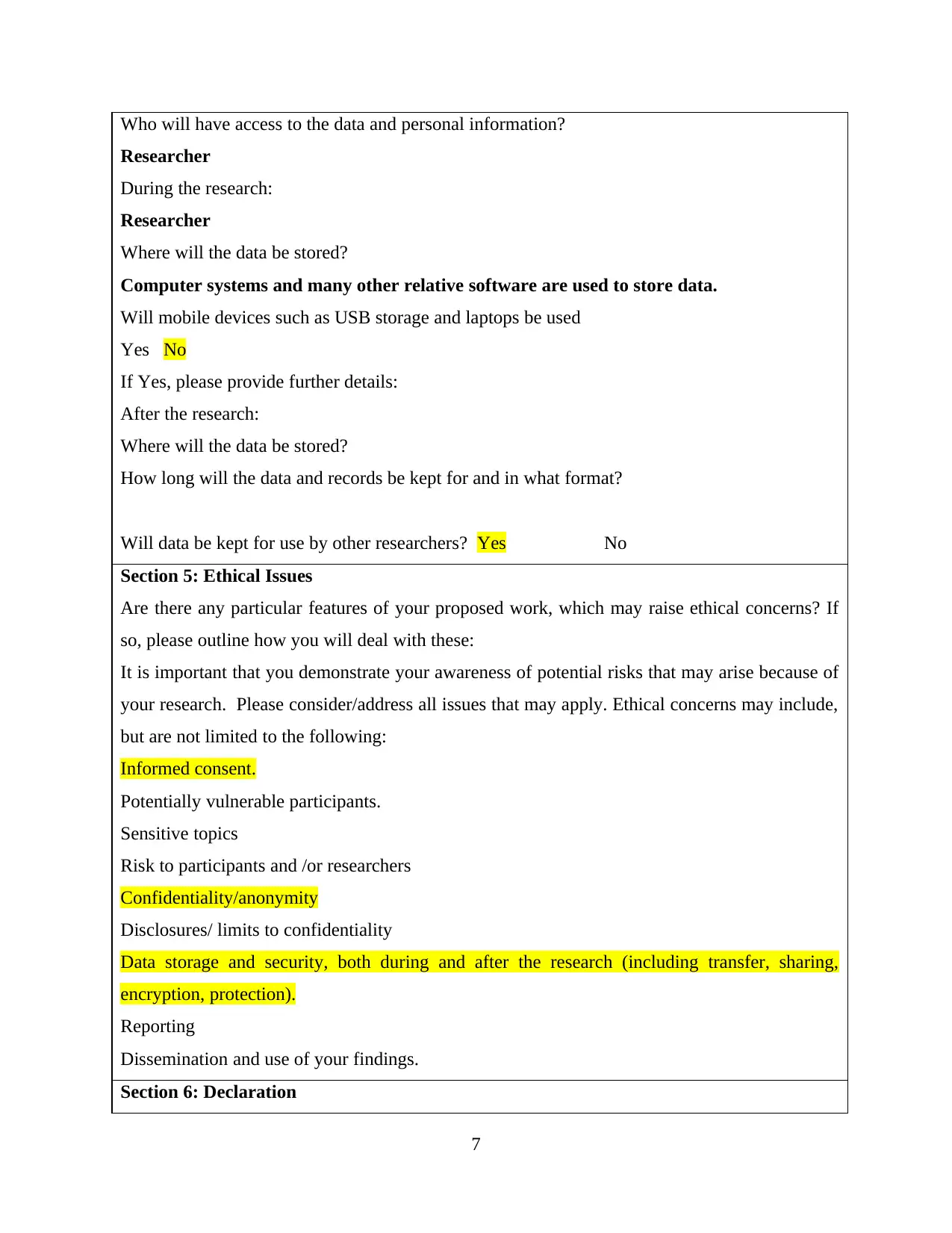
Who will have access to the data and personal information?
Researcher
During the research:
Researcher
Where will the data be stored?
Computer systems and many other relative software are used to store data.
Will mobile devices such as USB storage and laptops be used
Yes No
If Yes, please provide further details:
After the research:
Where will the data be stored?
How long will the data and records be kept for and in what format?
Will data be kept for use by other researchers? Yes No
Section 5: Ethical Issues
Are there any particular features of your proposed work, which may raise ethical concerns? If
so, please outline how you will deal with these:
It is important that you demonstrate your awareness of potential risks that may arise because of
your research. Please consider/address all issues that may apply. Ethical concerns may include,
but are not limited to the following:
Informed consent.
Potentially vulnerable participants.
Sensitive topics
Risk to participants and /or researchers
Confidentiality/anonymity
Disclosures/ limits to confidentiality
Data storage and security, both during and after the research (including transfer, sharing,
encryption, protection).
Reporting
Dissemination and use of your findings.
Section 6: Declaration
7
Researcher
During the research:
Researcher
Where will the data be stored?
Computer systems and many other relative software are used to store data.
Will mobile devices such as USB storage and laptops be used
Yes No
If Yes, please provide further details:
After the research:
Where will the data be stored?
How long will the data and records be kept for and in what format?
Will data be kept for use by other researchers? Yes No
Section 5: Ethical Issues
Are there any particular features of your proposed work, which may raise ethical concerns? If
so, please outline how you will deal with these:
It is important that you demonstrate your awareness of potential risks that may arise because of
your research. Please consider/address all issues that may apply. Ethical concerns may include,
but are not limited to the following:
Informed consent.
Potentially vulnerable participants.
Sensitive topics
Risk to participants and /or researchers
Confidentiality/anonymity
Disclosures/ limits to confidentiality
Data storage and security, both during and after the research (including transfer, sharing,
encryption, protection).
Reporting
Dissemination and use of your findings.
Section 6: Declaration
7
⊘ This is a preview!⊘
Do you want full access?
Subscribe today to unlock all pages.

Trusted by 1+ million students worldwide
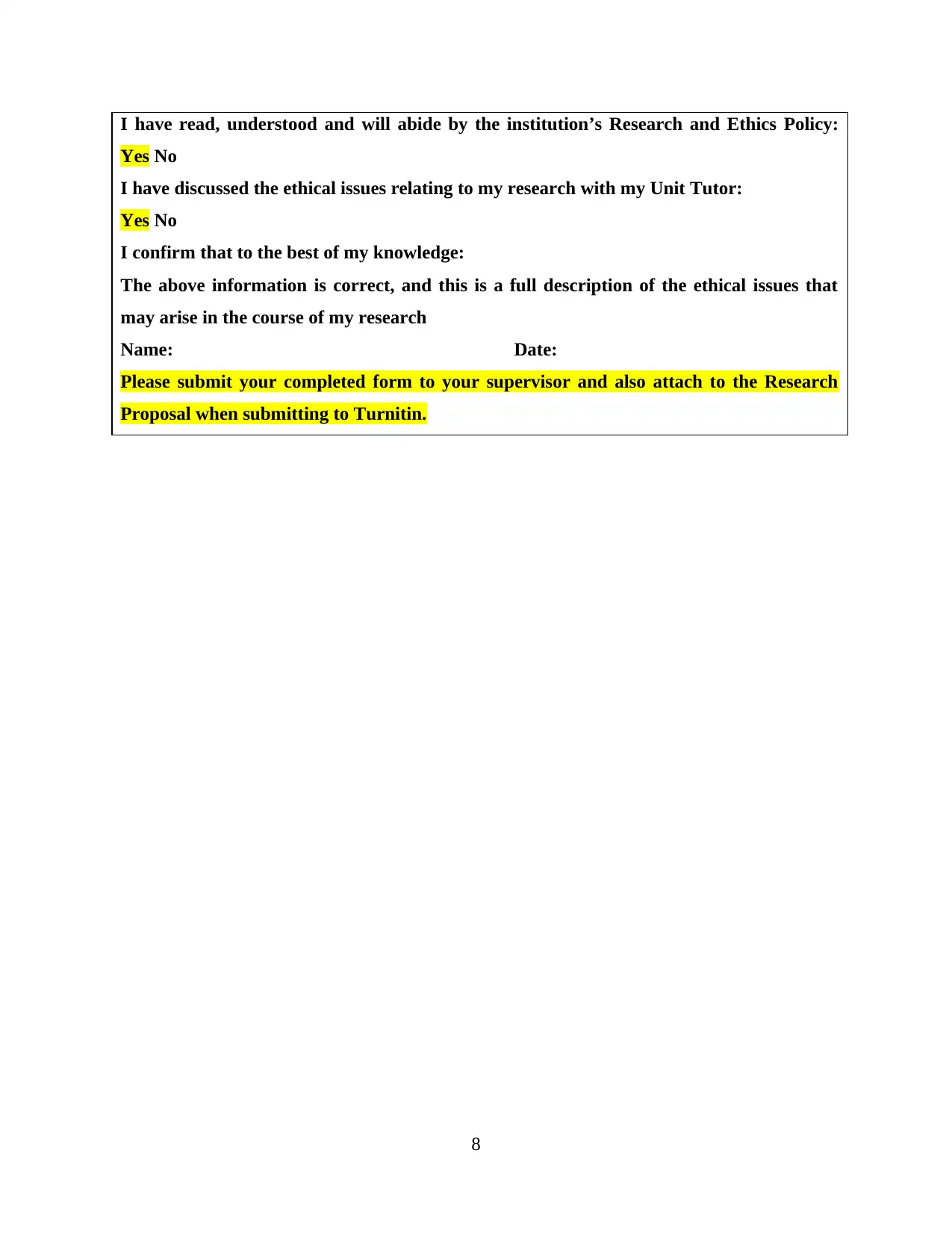
I have read, understood and will abide by the institution’s Research and Ethics Policy:
Yes No
I have discussed the ethical issues relating to my research with my Unit Tutor:
Yes No
I confirm that to the best of my knowledge:
The above information is correct, and this is a full description of the ethical issues that
may arise in the course of my research
Name: Date:
Please submit your completed form to your supervisor and also attach to the Research
Proposal when submitting to Turnitin.
8
Yes No
I have discussed the ethical issues relating to my research with my Unit Tutor:
Yes No
I confirm that to the best of my knowledge:
The above information is correct, and this is a full description of the ethical issues that
may arise in the course of my research
Name: Date:
Please submit your completed form to your supervisor and also attach to the Research
Proposal when submitting to Turnitin.
8
Paraphrase This Document
Need a fresh take? Get an instant paraphrase of this document with our AI Paraphraser
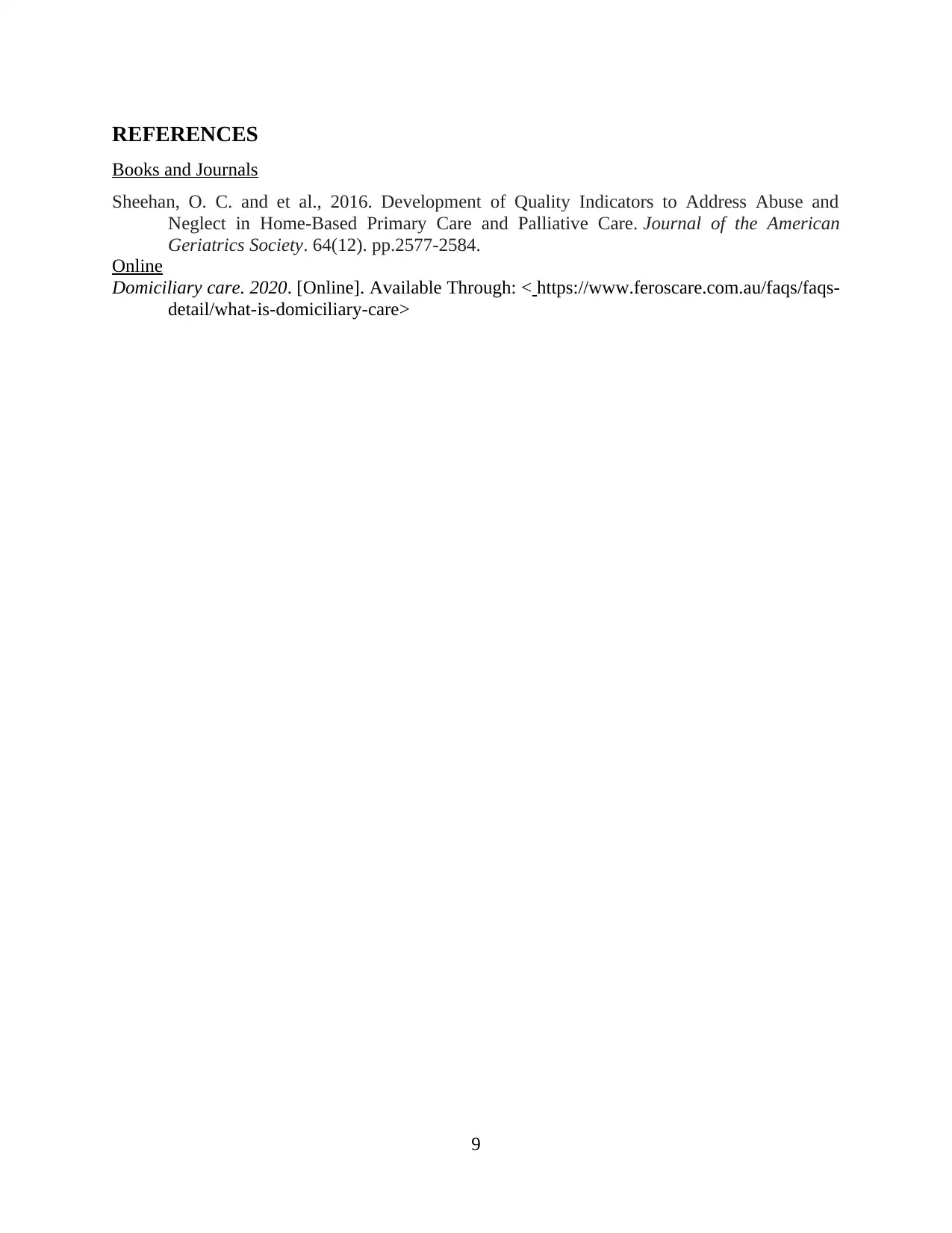
REFERENCES
Books and Journals
Sheehan, O. C. and et al., 2016. Development of Quality Indicators to Address Abuse and
Neglect in Home‐Based Primary Care and Palliative Care. Journal of the American
Geriatrics Society. 64(12). pp.2577-2584.
Online
Domiciliary care. 2020. [Online]. Available Through: < https://www.feroscare.com.au/faqs/faqs-
detail/what-is-domiciliary-care>
9
Books and Journals
Sheehan, O. C. and et al., 2016. Development of Quality Indicators to Address Abuse and
Neglect in Home‐Based Primary Care and Palliative Care. Journal of the American
Geriatrics Society. 64(12). pp.2577-2584.
Online
Domiciliary care. 2020. [Online]. Available Through: < https://www.feroscare.com.au/faqs/faqs-
detail/what-is-domiciliary-care>
9
1 out of 11
Related Documents
Your All-in-One AI-Powered Toolkit for Academic Success.
+13062052269
info@desklib.com
Available 24*7 on WhatsApp / Email
![[object Object]](/_next/static/media/star-bottom.7253800d.svg)
Unlock your academic potential
Copyright © 2020–2026 A2Z Services. All Rights Reserved. Developed and managed by ZUCOL.





